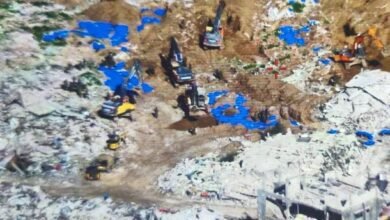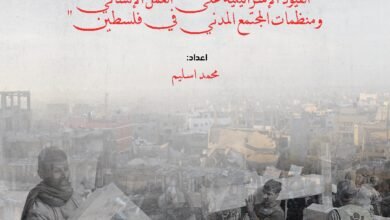
The Palestinian Executive Authority’s threat to dissolve the Palestinian Legislative Council
Date: 26 Dec 2018
Ref: /2018
Ms. Buthaina,
Human Rights Advisor – IPU.
Subject: The Palestinian Executive Authority’s threat to dissolve the Palestinian Legislative Council.
The International Commission to Support Palestinians’ Rights (ICSPR) highly appreciates your acclaimed role in ensuring the promotion of human rights.
In reference to the above, the Palestinian Executive Authority, represented by President Mahmoud Abbas, has recently stepped up the threat of taking a decision to dissolve the Palestinian Legislative Council.
The Palestinian executive authority has not only taken illegal action against deputies and members of the Legislative Council and unlawfully lifting constitutional immunity, restricting their freedom of movement travel, imposing illegal sanctions on them and depriving some of them of their passports, but has publicly announced its desire and thought to dissolve the Palestinian Legislative Council.
The threat of dissolution of the Legislative Council is an extension of the political crisis and a continuation of the sharp division between the Fatah and Hamas movements, as well as an extension of the state of the President’s unilateral decision. The adoption of such a decision would mean the death sentence on the Palestinian constitutional experience because it will accelerate the erosion of the Palestinian constitutional and political order, and the beneficiary of this is the occupation, which works to liquidate the cause, while the Palestinians are steeped in their internal differences.
That the Palestinian Basic Law and its amendments did not grant the president absolute power to dissolve the Palestinian Legislative Council in normal or emergency circumstances, and that when the powers of the President of the National Authority were limited to the third part of it; this means that the rule of the constitutional legislator is the illegality of dissolving the Legislative Council in any circumstances- Regular and extraordinary.
All the justifications that the President and his team are trying to provide to justify this step can not be recognized, it is corrupt and can not justify this decision. The constitutional nature of the Palestinian political system, which was considered under Article 5 of the amended Palestinian Basic Law, the system of government in Palestine is a mixed parliamentary democracy ( A parliamentary system that makes the government accountable to the parliament and has the power to discredit it, and a presidential system on the one hand that makes the election of the president directly by the people) confirms that the constitutional system fortifies the legislative authority and guarantees its independence from the executive authority.
The justification of the President’s right to employ the Central Council to dissolve the Legislative Council under the pretext that he is the originator of the Authority is illegal for a variety of reasons. The Legislative Council is an elected body by the people while the Central is not. The source of power is the people, not the Authority itself as article 2 stipulates “The people are the source of authority and exercised by the legislative, executive and judicial authorities on the basis of the separation of powers as set out in this Basic Law; the current Central Council received an illegal mandate during the last National Assembly which was not brought before the Legal Committee and the required procedures were not applied in the event of any change to the Statute).
The justification that the current Legislative Council has completed its term of office, and that in practice it does not meet and does not perform its duties, it is by virtue of the dissolved. The same rationale applies to the president because his term of office has expired, and the central council has established the authority as a whole and can not dissolve part of it (the legislative Council) and keeps other parts (the president and government ministries and security agencies). The second amendment to the Basic Law in 2005, in particular the addition of Article 47 bis, states: “The term of office of the current Legislative Council shall expire on the performance of the newly elected Council.” This text is clear and requires no interpretation or interpretation.
The claim of sources from the Palestinian presidency that modern constitutional systems are based on the idea of a flexible separation between the three powers was just to justify the president’s decision. The fact is that modern constitutional regimes are based on the idea of a flexible separation between the three powers. As long as this is the case, the president has the right to dissolve the Legislative Council, this law holds half the truth, since there are regulations that allow this right, but the amended Palestinian Basic Law guarantees the legislative authority the right to control the executive branch’s actions by: revoking confidence and the right of questioning and the right to conduct a parliamentary investigation, In other words, the legislative authority can revoke confidence of the Palestinian government. Article 113 provides that “the Legislative Council shall not be dissolved or suspended during the period of the state of emergency.
The most recent justification is to say that the Palestinian president has the right to issue decisions in the case of necessity under Article 43, which gives him the right to issue decisions by law in case of necessity. This entitles him to issue a decision to dissolve the Legislative Council. It is absolutely not permissible to grant this to the president on the basis of the text of Article (43) of the Basic Law: The purpose of the legislator from organizing this provision is confined to emergency situations that threaten the stability of public order in society, and that granting the power to dissolve parliament to the President of the Executive Authority is an amendment to the provisions of the Basic Law, while the only authority to amend its provisions is the Legislative Council, after the approval of a two-thirds majority of the members of the Council on the amendment.
If the legislator is in the most dangerous and severe conditions on the country – the state of emergency – prohibits the dissolution of the Legislative Council, it is not permissible to dissolve it by law. And that this right does not implicitly recognize nor detect from the totality of the texts nor the purposes of the legislator, if any, but needs to be explicitly stated that a clear constitutional text is clear and conclusive and the seriousness of this action and its importance.
Ms. Buthaina,
Any decision to dissolve the Legislative Council lacks any objective and legal justification means that the Palestinian executive authority will continue to encroach on the Palestinian legislative authority. It will inevitably lead to deepening the internal Palestinian division and disrupt the implementation of the provisions of the Palestinian Basic Law, which could lead to reciprocal reactions between Hamas and Fatah, such as Hamas’s proposal to hold a legislative session in Gaza, withdraw the legitimacy of President Mahmoud Abbas and undermine his powers, while Abbas will also respond to this step by taking further punitive steps against Gaza Strip, such as an end to all forms of economic relationship between the West Bank in the framework of ” jump Into Hell “.
The International Commission sends you this letter as an urgent appeal to act quickly, including taking early warning measures for the Palestinian Executive not to take this step, by issuing a clear position that rejects the threat of the Palestinian Authority to dissolve the Legislative Council and declares that this action is illegal.
Your quest for the preservation and support of the modern Palestinian constitutional experience is a duty of the international parliament and its members. Your quest for the independence of the legislative authority and its immunity from the manipulation of the executive power is a supreme goal based on the international desire to support democratic processes.
Best Regards,





